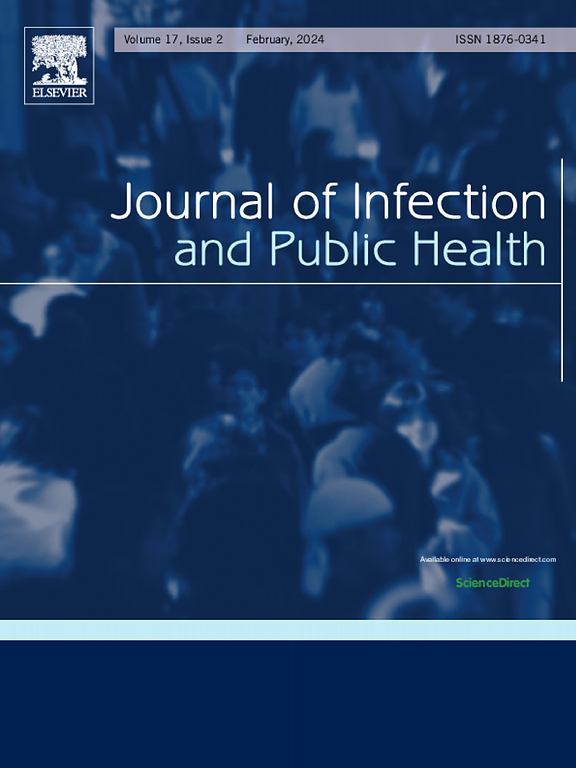Clinical impact of rapid test for macrolide-resistance gene mutation among cases with Mycoplasma pneumoniae in Japan
IF 4
3区 医学
Q1 INFECTIOUS DISEASES
引用次数: 0
Abstract
Macrolide-resistant Mycoplasma pneumoniae (MP) infections are reported worldwide. Smart Gene® (SG) Myco, a point-of-care testing tool, detects nucleic acids and macrolide-resistance gene mutations of MP. The objective of this study was to evaluate the clinical impact of the rapid detection of macrolide resistance gene mutations in children with MP. This retrospective study included children ≤ 18 years of age with microbiologically confirmed MP requiring antimicrobial treatment. Clinical outcomes were compared between the SG Myco test and untested groups. A total of 298 participants (121 in the SG Myco test group and 177 in the untested group) were included. Macrolide resistance gene mutations were detected in 47.9 % of patients in the SG Myco-tested group. SG Myco test implementation was positively associated with macrolide use (adjusted odds ratio 2.20 [1.22, 3.99]; p = 0.009) and negatively associated with tetracycline use (adjusted odds ratio 0.41 [0.23, 0.75]; p = 0.003). A significant reduction in tetracycline use was observed following the implementation of the SG Myco test among children and adolescents with MP who required antimicrobial treatment. The results of our study demonstrated that rapid testing of macrolide resistance gene mutations facilitates timely and appropriate antimicrobial selection.
日本肺炎支原体大环内酯耐药基因突变快速检测的临床影响
大环内酯耐药肺炎支原体(MP)感染在世界范围内均有报道。Smart Gene®(SG) Myco是一种即时检测工具,可检测MP的核酸和大环内酯耐药基因突变。本研究的目的是评估快速检测大环内酯类耐药基因突变对MP患儿的临床影响。本回顾性研究纳入≤ 18岁、经微生物学证实需要抗菌治疗的MP患儿。比较SG Myco试验组和未试验组的临床结果。共纳入298名参与者(SG Myco试验组121名,未试验组177名)。SG myco检测组47.9% %的患者检测到大环内酯类耐药基因突变。SG Myco试验实施与大环内酯类药物使用呈正相关(调整优势比为2.20 [1.22,3.99];p = 0.009),与四环素使用负相关(调整优势比为0.41 [0.23,0.75];p = 0.003)。在需要抗菌素治疗的MP儿童和青少年中实施SG Myco试验后,观察到四环素的使用显著减少。我们的研究结果表明,快速检测大环内酯类耐药基因突变有助于及时和适当的抗菌药物选择。
本文章由计算机程序翻译,如有差异,请以英文原文为准。
求助全文
约1分钟内获得全文
求助全文
来源期刊

Journal of Infection and Public Health
PUBLIC, ENVIRONMENTAL & OCCUPATIONAL HEALTH -INFECTIOUS DISEASES
CiteScore
13.10
自引率
1.50%
发文量
203
审稿时长
96 days
期刊介绍:
The Journal of Infection and Public Health, first official journal of the Saudi Arabian Ministry of National Guard Health Affairs, King Saud Bin Abdulaziz University for Health Sciences and the Saudi Association for Public Health, aims to be the foremost scientific, peer-reviewed journal encompassing infection prevention and control, microbiology, infectious diseases, public health and the application of healthcare epidemiology to the evaluation of health outcomes. The point of view of the journal is that infection and public health are closely intertwined and that advances in one area will have positive consequences on the other.
The journal will be useful to all health professionals who are partners in the management of patients with communicable diseases, keeping them up to date. The journal is proud to have an international and diverse editorial board that will assist and facilitate the publication of articles that reflect a global view on infection control and public health, as well as emphasizing our focus on supporting the needs of public health practitioners.
It is our aim to improve healthcare by reducing risk of infection and related adverse outcomes by critical review, selection, and dissemination of new and relevant information in the field of infection control, public health and infectious diseases in all healthcare settings and the community.
 求助内容:
求助内容: 应助结果提醒方式:
应助结果提醒方式:


